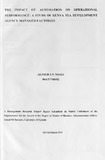| dc.description.abstract | Technology can be the basis of realizing the operational performance objectives of quality,
customer-focus, dependability, flexibility, and cost-reduction. Automation is often chosen over manual methods because it has the advantage of providing consistency and control over the final product. Automation also provides an organization with the ability to collect data about the performance of its process and to analyze the variables that contribute to achievement of performance objectives (Beckman and Rosenfield, 2008).
This study investigated the impact of automation on the operational performance of the
KTDA managed factories. A total of sixty three factories out of the sixty five managed
participated in this study. Primary data was collected from production managers inquiring into the impact on automation on operations as well as on strategy.
The results of the study show that although fully automated factories have higher
operational performance compared to partially automated ones, the overall performance is not significantly different. Further, the study did not find any significant difference between labour costs incurred by fully automated and partially automated factories. This seems to imply that replacement of workers by machines does not significantly change the cost composition of the factories under study. The study, however, found that factories which report full automation considered that they had achieved a higher competitive advantage over their competitors in comparison with those less automated.
The study concludes that the critical cost factor (s) in KTDA managed factories be
identified through further investigation. It also recommends that KTDA management align its automation strategy with a customer-centric perspective, rather than pursuing automation independent of customers as the results of this study indicate. | en |

